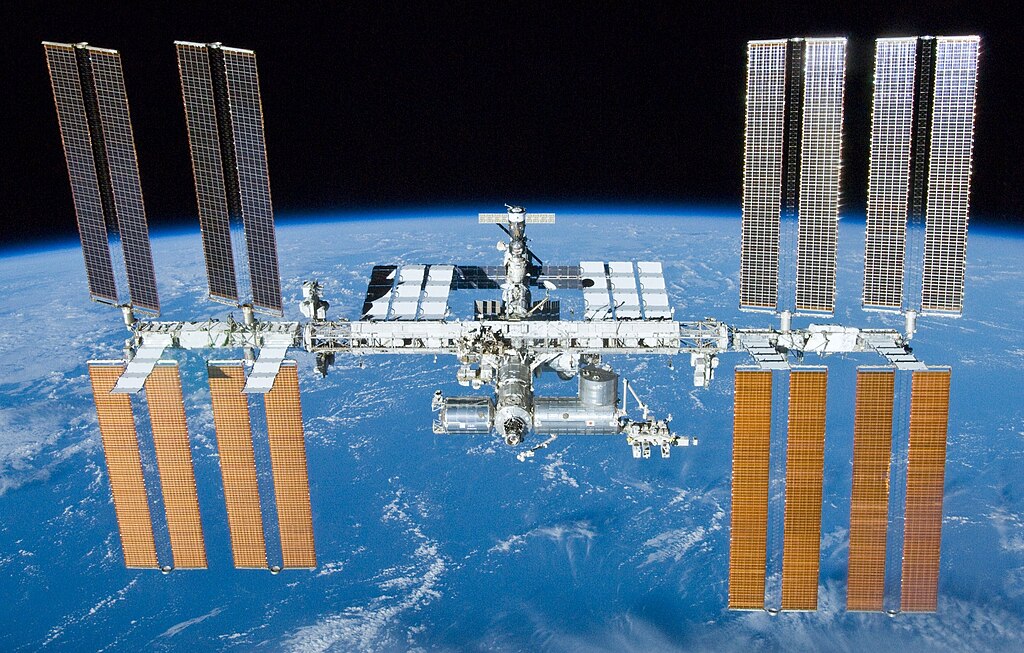
The International Space Station (ISS), operated by the space agencies of the United States, Russia, Japan, Europe, and Canada, has been continuously occupied by humans since 2000 November 2.
(Image Sources: NASA, Wikipedia.org, By NASA/Crew of STS-132 - http://spaceflight.nasa.gov/gallery/images/shuttle/sts-132/hires/s132e012208.jpg(http://spaceflight.nasa.gov/gallery/images/shuttle/sts-132/html/s132e012208.html), Public Domain, https://commons.wikimedia.org/w/index.php?curid=10561008)
By Glenn A. Walsh
Reporting for SpaceWatchtower
The U.S. National Laboratory at the
International Space Station (ISS) has announced that research into
new biomedical products, possibly including transplant organs, will
be spear-headed on the ISS by the McGowan Institute for Regenerative
Medicine of the University of Pittsburgh. NASA approached the Pitt
researchers last year about leading a multi-year effort on the space
station.
This research could include the
perfection of techniques to create body parts and organs using 3-D
Printers. Without gravity weighing-down gel-like materials, some
studies have indicated that 3-D Printers could have greater success
creating intricate, human tissues.
Such research, if successful, could
lead to a new era when the shortage of body organs would no longer be
a major problem. Research in this area is advancing quickly,
including the successful implantation of artificial ovaries in mice
in May of 2017 and the creation of 3-D-printable water gel at Rutgers
University.
While such research is usually funded
by the government or academia, McGowan Institute Director Dr. Bill
Wagner indicates that funding from the private sector would also be
sought. "The whole idea here with the International Space
Station is to move it to a point where it's become commercialized and
is being supported by the private sector," Dr. Wagner said.
In February of last year, the Trump
Administration indicated an interest in privatizing the ISS by 2024,
to free-up government funds for the human return to the Moon and
later human exploration of Mars. However, last month NASA
Administrator Jim Brigantine assured NASA supporters at the annual
International Space Station Research and Development Conference that
U.S. Government funding for the ISS would remain intact.
The McGowan Institute for Regenerative
Medicine at the University of Pittsburgh has a staff of 250
researchers and support people and studies the failure of organs and
bodily tissues with the aim to find ways to prevent such failures.
The McGowan Institute looks for ways to
enhance the body's natural abilities to heal itself. It is believed
that such research in micro-gravity can lead to more medical
advances. Although research has been done on the ISS for many years,
this Pitt – ISS alliance is the first-of-its-kind.
Internet Links to Additional Information ---
International Space Station:
Link 1 >>> https://www.nasa.gov/mission_pages/station/main/index.html
Link 2 >>> https://en.wikipedia.org/wiki/International_Space_Station
NASA's Research on the International Space Station:
Link >>> https://en.wikipedia.org/wiki/Scientific_research_on_the_International_Space_Station#NASA's_ISS_research_and_science_activity
McGowan Institute for Regenerative Medicine:
Link 1 >>> https://mirm-pitt.net//
Link 2 >>> https://en.wikipedia.org/wiki/McGowan_Institute_for_Regenerative_Medicine
3-D Printing: Link >>> https://en.wikipedia.org/wiki/3D_printing
Source: Glenn A. Walsh Reporting for SpaceWatchtower, a project of Friends of the Zeiss.
Monday, 2019 August 19.
Like This Post? Please Share!
More Astronomy & Science News - SpaceWatchtower Twitter Feed:
Link >>> https://twitter.com/spacewatchtower
Astronomy & Science Links: Link >>> http://buhlplanetarium.tripod.com/#sciencelinks
Want to receive SpaceWatchtower blog posts in your in-box ?
Send request to < spacewatchtower@planetarium.cc >.
gaw
Glenn A. Walsh, Informal Science Educator & Communicator:
< http://buhlplanetarium2.tripod.com/weblog/spacewatchtower/gaw/ >
Electronic Mail: < gawalsh@planetarium.cc >
Project Director, Friends of the Zeiss: < http://buhlplanetarium.tripod.com/fotz/ >
SpaceWatchtower Editor / Author: < http://spacewatchtower.blogspot.com/ >
Formerly Astronomical Observatory Coordinator & Planetarium Lecturer, original Buhl Planetarium & Institute of Popular Science (a.k.a. Buhl Science Center), Pittsburgh's science & technology museum from 1939 to 1991.
Formerly Trustee, Andrew Carnegie Free Library and Music Hall, Pittsburgh suburb of Carnegie, Pennsylvania.
Author of History Web Sites on the Internet --
* Buhl Planetarium, Pittsburgh:
< http://www.planetarium.
* Adler Planetarium, Chicago:
< http://adlerplanetarium.
* Astronomer, Educator, Optician John A. Brashear:
< http://johnbrashear.tripod.com >
* Andrew Carnegie & Carnegie Libraries:
< http://www.andrewcarnegie.
